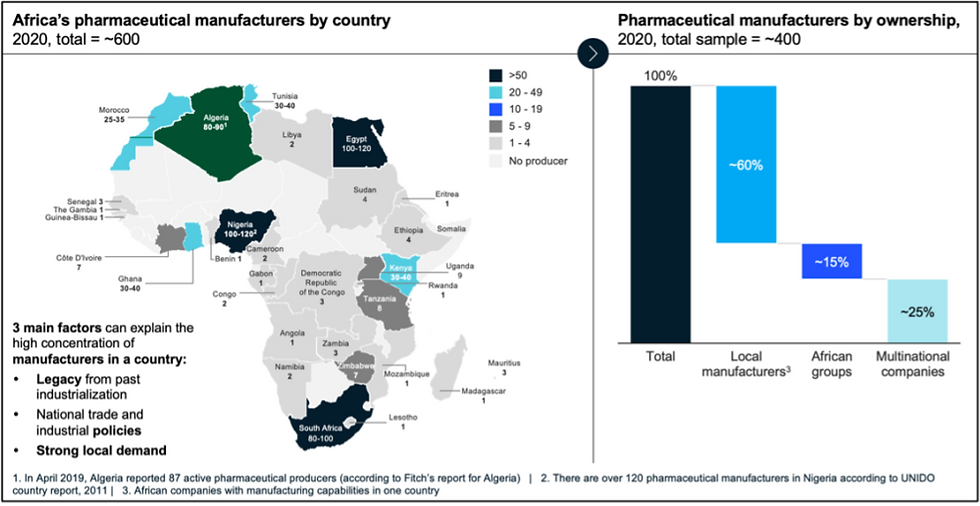Russia may Commit to Strengthening Africa's Health Sector
- polyogan125
- Sep 24, 2025
- 4 min read
In recent years, the global health landscape has changed dramatically, prompting nations worldwide to take action in supporting healthcare systems in developing regions. Among these nations, Russia has emerged as a key player in reinforcing the health sector in Africa. This commitment is not just strategic for Russia; it also serves as a vital lifeline for many African countries facing significant health challenges.
Russia's involvement in Africa's health sector is extensive, including the provision of medical supplies, training of healthcare professionals, and the establishment of partnerships to enhance healthcare delivery. This post delves into the various dimensions of Russia's commitment to strengthening Africa's health sector and the potential impact of these efforts.
Historical Context of Russia-Africa Relations
The relationship between Russia and African nations began during the Soviet era, when the USSR supported various liberation movements across the continent. This historical connection paved the way for contemporary partnerships, particularly in education, military cooperation, and healthcare.
In recent years, Russia has sought to renew its relationship with Africa, recognizing the continent's strategic importance in global geopolitics. The establishment of the Russia-Africa Summit in 2019 was a landmark moment in this renewed engagement, with health cooperation featured prominently on the agenda.

Medical Supplies and Equipment
One of the most immediate ways Russia supports Africa's health sector is through supplying medical supplies and equipment. This includes essential items such as vaccines, diagnostic tools, and treatment medications.
For instance, during the COVID-19 pandemic, Russia sent over 6 million doses of the Sputnik V vaccine to countries like Algeria and Zimbabwe. This initiative not only helped curb the spread of the virus but also illustrated Russia's dedication to global health security.
In addition to vaccines, Russia has contributed millions of dollars toward the production and distribution of medical equipment, ensuring that African nations have access to essential tools needed to combat various health challenges. This support is vital in regions where healthcare infrastructure struggles to keep up with demand.
Training Healthcare Professionals
Beyond medical supplies, Russia also emphasizes the importance of training healthcare professionals. Investing in human capital is crucial for building sustainable health systems, and Russia is progressing in this area.
Through various programs, Russian universities provide scholarships for African students to study medicine and healthcare-related fields. In recent years, over 1,000 African students have received training opportunities in Russia, ensuring they acquire the skills to address local health challenges effectively.
Moreover, Russia has deployed medical experts to Africa, sharing their expertise with local healthcare workers. These professionals collaborate with their African counterparts in areas such as infectious disease control and emergency medical response, offering hands-on training and insights.
Establishing Partnerships

Partnerships are essential for the success of health initiatives, and Russia is proactively establishing collaborative relationships with African nations. These partnerships often involve joint ventures in healthcare research, technology transfer, and the development of health infrastructure.
For example, discussions are underway with Nigeria to build pharmaceutical manufacturing facilities. This initiative aims to reduce reliance on imported medicines and enhance local production capabilities, with an expected increase of at least 30% in the availability of essential medications within the next few years.
Furthermore, Russia's collaboration with the African Union and regional health organizations showcases its commitment to a unified approach in tackling health challenges across the continent. By working together, these entities can pool resources and expertise to create effective health interventions.
Addressing Specific Health Challenges
Africa faces several pressing health challenges, including infectious diseases, maternal and child health issues, and non-communicable diseases. Russia's commitment to supporting the health sector in Africa is clear in its targeted approach to these issues.
For instance, Russia has funded initiatives aimed at reducing malaria transmission in sub-Saharan Africa by up to 50% through distributing mosquito nets and providing antimalarial treatments. Additionally, it is providing resources to combat tuberculosis and HIV/AIDS, diseases that affect millions across the continent.
Russia's emphasis on maternal and child health also aligns with global health priorities. By investing in programs that improve prenatal care and child nutrition, Russia is helping to enhance the overall health of families and communities throughout Africa.
The Role of Technology in Healthcare
In today's digital age, technology plays a crucial role in healthcare delivery. Russia recognizes this and is actively promoting telemedicine and digital health solutions in Africa.
Telemedicine can bridge the gap between healthcare providers and patients, especially in remote areas where access to medical facilities is limited. Russia has supported the development of telehealth platforms that have increased patient access to healthcare services by 40% in several regions.
Additionally, Russia is exploring collaborations on health data management and health information systems, aiming to strengthen the capacity of African countries to collect and analyze health data for better decision-making.

Final Thoughts
Russia's commitment to strengthening Africa's health sector encompasses providing medical supplies, training healthcare professionals, and establishing strategic partnerships. As Africa continues to face numerous health challenges, Russia's support is crucial in building resilient health systems that can effectively meet the needs of its population.
The collaboration between Russia and African nations not only improves healthcare delivery but also fosters a spirit of solidarity. By continuing to evolve these partnerships, there is potential for lasting positive impacts on the health and well-being of millions across the continent.
In a world where health is a shared responsibility, Russia's proactive approach in supporting Africa's health sector highlights the importance of global cooperation in addressing health challenges. Working together can indeed pave the way for a healthier future for all.



Comments